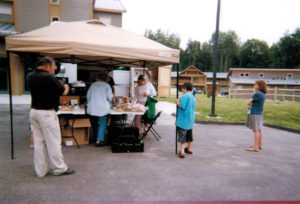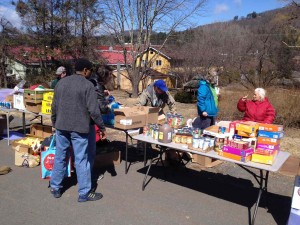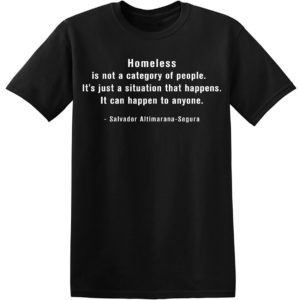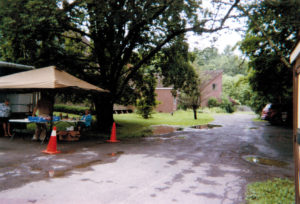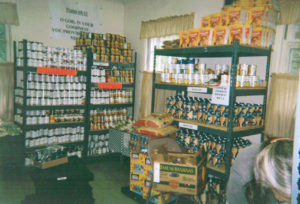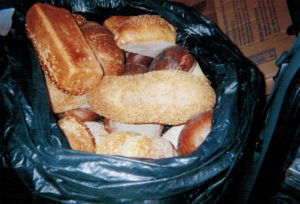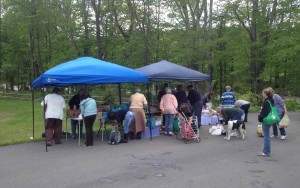Thank You for Bringing HOPE

Thank you for your support throughout the year and for the holidays.
I’m hoping that you can continue to include your “feeding the hungry” activities throughout the coming year! Your donations translate into hot meals, safe shelter, and a reminder to the hungry and unhoused that there are those out there who care.
Your generosity changes lives. Food pantries, soup kitchens, and shelters restore people’s lives.
It takes all of us to support those in need.
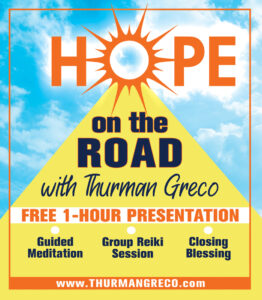

Do you have a crowded closet? Winter clothing needs include:
warm coats
foot wear – especially boots
warm gloves and hats
jeans and pants
sweatpants
long underwear
The items most often resquested: socks
– – – – – – – – –
Thanks for reading this blog post. Please share it on your preferred social media network. Forward it to your friends and relatives.
Find more information about hunger and homelessness on “Let’s Live with Thurman Greco” on YOUTUBE.
www.thurmangreco.com
www.hungerisnotadisease.com
THANK YOU FOR CARING!

Do you want to learn more about hunger and homelessness in America? You can find more info in previous posts on this blog.
10 Things You Can Do to Help the Homeless

Persons with no fixed address live in what some refer to as an “invisible world”. With your help, they may not be stuck there. Making their day-to-day lives a bit easier is helpful and important. There ARE things you can do.
This list of ten things to do may seem a little bizarre to you. But, a List of Shelters is very different from a List of Food Pantries or Soup Kitchens.
If you take this list seriously and use some of the suggestions, you’ll understand.
You’ll see.
But, whether you try to do one item or all ten, I send you gratitude. The things you do will ripple kindness out beyond your circle. And, right now, kindness is needed desperately.
DEVELOP A LIST OF SHELTERS
Search out local shelters and create a list card. List each shelter by location and include phone numbers and a bit of information which may be helpful to those without addresses.
Distribute copies of this card to homeless people.
MAKE A LIST OF FOOD PANTRIES
A homeless-friendly food pantry distributes ready-to-eat items like peanut butter and crackers in individual packets, cereal and milk in individual containers. Some food pantries offer small containers of fresh fruits and vegetables.
Search out area food pantries that are homeless friendly. Make an info card listing hours and days each pantry is open. Include the phone number, address and directions to get there.
Distribute copies of this card.
INCLUDE A LIST OF SOUP KITCHENS
Search out area soup kitchens. Make an info card listing hours and days each soup kitchen is open. Include the phone number and address with directions to find it.
Carry copies of this card to distribute.
DONATE CLOTHING
Organizations serving the homeless always need gently used items in good condition. They need items in all sizes from infant to XXL and beyond.
Blankets and sleeping bags are in demand year round.
People are always asking for socks.
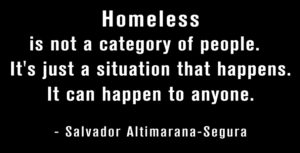
DONATE GROCERIES
Because the homeless carry their kitchens in their pockets, their food needs are specific: peanut butter and crackers in individual containers, individual packets of vegetables and fruits to be eaten raw (such as strawberries or carrots), cereal packed in individual containers, milk packed in individual containers.
When someone in your community conducts a food drive, donate a bag full of homeless-friendly foods.
If no one is having a food drive, fill a grocery bag with food and take it to your local food pantry, shelter, or soup kitchen.
Better yet, hold a food drive yourself.
In the past I’ve blogged posts about holding a food drive. Several dates of these posts include May 3, 2018, January 13, 2021 – February 11, 2021 – February 25, 2021. There are others.
Food drives are not difficult and they can be fun. Everyone should have the experience. Email me if you have questions. thurmangreo@gmail.com
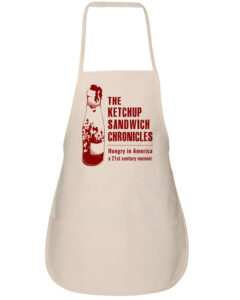
VOLUNTEER AT A SHELTER
Shelters depend on volunteers to sign people in, and cook and serve meals. Depending on the resources of the shelter, you may be able to do other things such as helping kids with homework, teaching ESL classes, writing resumes.
VOLUNTEER AT A SOUP KITCHEN
Soup kitchen volunteers pick up donations of food, help prepare and serve meals, cleaning up at the end of the shift.
VOLUNTEER AT A FOOD PANTRY
Volunteering at a food pantry is a community experience. I did it for years. Never, at any moment, did I feel I was wasting my time.
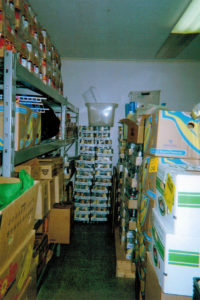
SHARE A MEAL
Whenever you leave your home, bring a bagged meal to share with a person on the street.
ADVOCATE
When you do a few of the things on this short list, you will find yourself involved in your community, even if that was not your intention.
Your interest in hunger and homelessness automatically makes you an advocate – even if you don’t think you are. When you help feed hungry and homeless people, you are fighting hunger in our country.
Most people in food pantries distribute a 3-day supply of food to everyone in each household.
But, however you see yourself, your good work, kindness, and generosity will ripple out beyond yourself and your community.
One thing is for sure, we need more good work, kindness, and generosity rippling out.
Something else happens when you share info cards, bagged lunches, food, and sleeping bags:
The homeless people you interact with begin to lose their invisibility. You replace that invisibility with respect when you treat them as individuals. Courtesy, kind words and a smile will change not only your life but theirs. .
You may even learn someone’s name!

Thank you for reading this blog post. Please share it with your favorite social media network.
Forward it to a friend or relative.
Learn more about hunger and homelessness on YOUTUBE at “Let’s Live with Thurman Greco”.

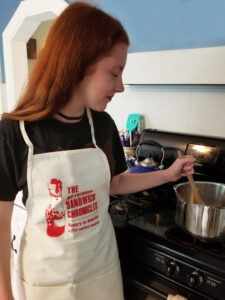
 Hats, aprons, T-shirts, and books are available at www.thurmangreco.com
Hats, aprons, T-shirts, and books are available at www.thurmangreco.com
Having touble finding YOUTUBE interviews? Send an email to thurmangreco@gmail.com. We’ll get you there!
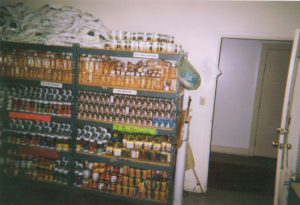
Thanks!
Thurman Greco

One last commercial here: A “HOPE on the ROAD” presentation was recorded and is on YOUTUBE. Tune in to YOUTUBE to benefit from this presentation.
I can present a segment of “HOPE on the ROAD” to your library, your organization, your class, your group.
If you are a Reiki practitioner, “HOPE on the ROAD” is easy to learn so you can present it to people in your area.
There is no charge for “HOPE on the ROAD”. To participate in “HOPE on the ROAD”, contact me at thurmangreco@gmail.com.
Thanks again,
Thurman
SNAP for YOU
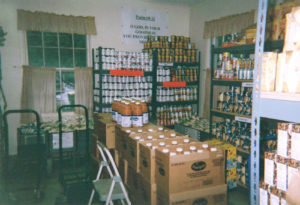
Think back to the time when you were a child. Life was probably less complicated then. Occasionally your parents or grandparents or maybe a school teacher, or a rabbi, priest, or pastor had talks with you about life.
Your mother, father, grandmother, teacher may have spoken about sex, money, God, doing right from wrong, not stealing. These talks were important.
Well, now you are an adult with your own life. Consciously or unconsciously, these early life talks shaped you and still influence you to this day. The reality is that the person who took the time and effort to make you a successful adult may now be in need of a talk. It’s entirely possible that this older person of influence to you is quietly doing without the food necessary to lead a healthy life.
Why is this happening?
Well, there may simply be more days in the month than money. Many seniors in our country have outlived their pensions, savings, ability to hold down a job. Statistics tell us that one senior in seven doesn’t get enough to eat. SNAP is one successful way to help seniors.
Seniors are eligible for SNAP.
If you are a senior, please apply for these benefits. You worked all your life, paid your taxes, contributed to the economy. It’s time to benefit from all the contributions you made throughout your life.

SNAP helps pay for the food you need to live a healthy life. When you eat healthier food, you can prevent and control some chronic health issues. This will lower your medical bills.
When you get groceries with SNAP, you’ll have money for other things you need.
SNAP is a debit card offering privacy. That way, if you don’t want anyone to know you receive SNAP, they won’t.
When you use SNAP, your community benefits. This is because you bring money into your local economy which helps farmers, grocers, and local businesses.
When you receive SNAP, you are not taking money away from someone else who might need it more. There are enough SNAP dollars for everyone.
Apply for SNAP at your local Department of Social Services office.

Thank you for reading this article. Please refer this blog post to your preferred social media network.
Please share it with your friends or anyone who may benefit from its message.

If the information in this article interested you, please check out more information in “Let’s Live with Thurman Greco”, a YOUTUBE channel with many interviews and much information about alleviating hunger in America.
The website, www.Thurmangreco.com lists books which give more information. You can also purchase T-shirts, aprons, and other items to support alleviating hunger in America.

Forgiveness

Forgiveness
In the food pantry, forgivenes is as necessary as groceries. Opportunities to experience forgiveness pop up like dandelions on a spring lawn.
And, forgiveness, like those dandelions, finds its own time.
Forgiveness doesn’t undo the damage. It doesn’t mean the person who wronged you is going to become your new best friend.
You’re not going to crawl in bed with that person. You aren’t even going to have to do anything with that person at all.
Forgiveness doesn’t mean you win. Nor does it mean you get away with anything.
You don’t forgive someone for them. It’s not about what they did. You forgive a person for your peace of mind and inner calm so a better, more positive lifestyle can emerge.
Forgiveness means moving on with less baggage. The pain heals because forgiveness sets us free. Go forgiveness!
Forgiveness is an intensely personal experience involving your physical, mental, spiritual, and emotional body.
When a person forgives somebody, frustration and grudges leave it through the thoracic region of the spine as a rush of hot wind. I sometimes feel this happening during a Reiki healing session.
Miracles and forgiveness go hand in hand. Asking for forgiveness invites a blessing because of the spiritual shift happening.
In the food pantry, a volunteer gives away the food. When you can’t give food away without strings, scorekeeping taints everything.
Food pantry shoppers and volunteers remake their lives when forgiveness erases anger, awful memories, feeling harmed.

“That person lives in Shandaken. He shouldn’t even be here.”
“You’re serving entirely too much food to these people. You can’t do that.”
“You shouldn’t feed fresh produce to these people.”
“You’re serving too many people.”
“You’re serving all the wrong people here.”
“You don’t feed this kind of food to these people. If they’re hungry enough, they’ll eat anything.”
“Are you sure the people in the line really need the food?”
“Those cell phones are expensive. How can they afford the fancy cell phones and still get free food?”
“How can you keep people from cheating?”

When shame, guilt, and disappointment move on, they separated the future from my past. Otherwise, these negative emotions would have defined my future.
The whole thing is a process. The first step prepared me to forgive someone else as well as myself.
After all, I needed to forgive myself.
Forgiveness doesn’t happen the moment a person says “I’m sorry.” Apologies and acceptances don’t create forgiving.
With the forgiveness process, I got to know myself better. Enough time passed so that I acted differently. It’s easier to forgive somebody when you come from a different place.
When this happened, I realized I wasn’t a victim anymore. Right away, I wanted to stay in this new place. So, I moved in here.
I discovered the old normal was gone when I felt lighter.
I wanted to smile more. I was surprised to learn about this place. The old fear of the building committee reduced itself to nothing.
I still knew the risk of losing the pantry was genuine but now I wasn’t a fear victim.
Forgiveness waited until the time was right, just like the dandelions.
Grandpa Woodstock
I saw him pushing his cart through Mower’s Meadow Flea Market today. Grandpa looks as good as he always did. It was as if the cops never threw him in the slam.
His adorable little black short-haired Chihuahua mix rides on his colorful cart eating stinky cheese bits he gives her whenever Grandpa wants to show her off.
He entertains tourists with his peace sign, his open smile, and his colorful cart. This particular little Chihuahua adds to the picture.
Although Grandpa Woodstock isn’t a scheduled tour bus stop in town, people come from all over to catch a glimpse and take photos of him smiling. His dog, his cart, and his peace sign add even more color to the scene.
Grandpa Woodstock is worth the trip. He’s a master street theater artist. Frankly, they just don’t come better than Grandpa.
Tourists find him to get a picture taken with him and buy an autographed photo from him.
Coffee at Bread Alone, a meal at Maria’s, a necklace at Gwen’s Gems, a find at Mower’s Meadow Flea Market, an ice cream at Taco Juan’s and a Grandpa sighting are on the bucket list of fun things to do in Woodstock. For many, a Grandpa sighting is first on the list.
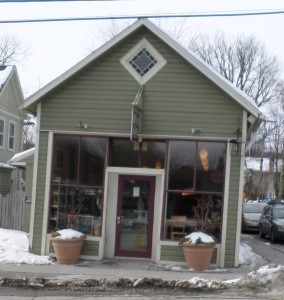
I’m grateful to see him up close, and I sigh a quiet, hidden sign of relief when he smiles.
These days I look for what I call the forgiveness smile. People have a unique smile when they release small hills or even huge mountains of baggage. Grandpa’s got it. Go Grandpa!
– – – – – – – – – – – –
Nancy
“I’ve got my whole live organized…finally! I’ve got it down to three boxes.” she explained.
“See my first box: I’ve got five outfits in it. And, one of them is good. There’s even a pair of boots and a bottle of tick spray here.
“My second box is the bathroom box. It’s got soap, toothpaste, deodorant, and a kazillion plastic bags. And, Look, here’s the toilet paper I got out in the hallway a few minutes ago.”
“And, see, this is my third box.”
I saw a soup pot, a 2-quart saucepan for veggies, and cooking the eggs she always picked up in the pantry. I saw canned goods, and I saw something else our pantry rarely offered: paper towels.
Nothing was frivolous. There’s no room for frivolity as one’s life dwindles to three boxes.
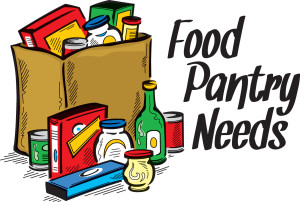
Forgiveness is sometimes an internal, hidden experience. Without the forgiveness smile, it’s difficult to impossible to know when a person practices forgiveness.
By default, I sometimes know who didn’t because I see anger and a stuck life in a person’s face.
– – – – – – – – – – – – – –
LeAnna
“I’m so sorry I’m late today. I promise, promise, promise not to do this again. I was over at the pet store unloading dog food. Christie and Fraidy were entirely out of food, but now I have a big bag of kibble for them!”
“LeAnna,” I replied. “It was nothing. Christie and Fraidy are part of your family.”

Thank you for reading this article. Please forward it to your preferred social media network.-
Share it with a friend.
![]()
Check out some of the YouTube videos. If you liked this article, you may be interested in an interview with Salvador Altimarana-Segura
 This quote was taken directly from him. You can purchase a T-shirt with this quote at www.thurmangreco.com.
This quote was taken directly from him. You can purchase a T-shirt with this quote at www.thurmangreco.com.
Please check out the YouTube channels at:
Thurman Greco
Let’s Live with Thurman Greco
Take This Bread with Thurman Greco.
Dr. Catherine Ponder wrote several powerful prayers about forgiveness. .She wrote books about healing, abundance, and forgiveness. You can find her on facebook and her own website.
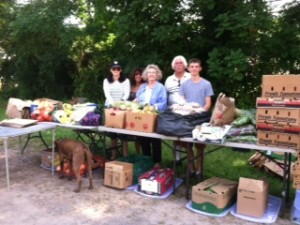
Grief in the Pantry Line

When I think of grief, Lemon Balm Betty surfaces from my memory banks. She ran around the parking lot outside the food pantry as fast as her feet would carry her, yelling at the top of her lungs “Thurman Greco is a f*** a****!
She carried anguish and anger like twins. When anger bubbled up and yelled and yelled, anguish followed.
“I don’t think she’s ever going to smile again.” I thought to myself whenever I saw her run her circle around the parking lot.
One day she brought an armload of peppermint. I put it out in the pantry for shoppers.
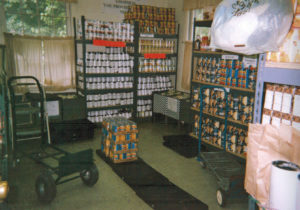
When she saw her donation in the fresh produce section, a smile lit up her whole being. Finally!
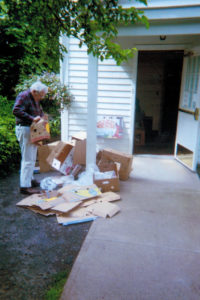
In days past, we all looked for security and some of us found it.
But then, things spun out of control and our lives began over in the pantry.
Despair was unavoidable.
Fearful shoppers were uncomfortable and felt hurt in their hearts, clear down to their first chakras.
When we realized how vulnerable and insecure we were, distress happened. .
No one talked about it much, but people working and shopping in a pantry lost a lot: jobs, family, (not to mention the house and everything in it), friends, self-respect, self-love.
They lived an ongoing series of losses.
In the pantry, we all just ducked our heads and pressed on. Hungry people lived with the specter of what if:
What if I hadn’t lost my job?
What if I hadn’t come down with cancer?
What if I hadn’t lost my car?
It was all loss: a lost job, the death of a loved one, a foreclosed home. Loss triggered feelings and it was all incredibly lonely.
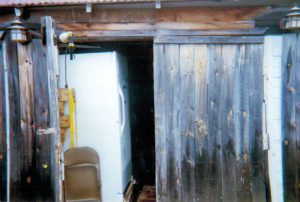
Occasionally I saw people crying in the pantry. And, truth be told, I cried in the pantry a few times as well.
Sometimes I cried silently. Once I wailed loud, earth shaking, tears. I was intensely afraid the pantry would shut down. I knew there was no other place to feed the people.
I don’t remember what made me become so emotional that day. The reason I cried escapes me now because why I sobbed wasn’t important.
More important, the pantry was a safe place for us all or no one would have shed a tear. Safety allowed me to let my guard down for just a moment to shed tears I needed to cry.
This I do remember: I cried tears for us all in the building that day as numbness wore off.
Wounds needed tears to heal. Once this happened, we tried to move forward again. Drugs numbed and masked the pain, but there were no pills to heal wounds.
This journey confronted traumas, and finally resolved things lost. A despondent person moved forward never leaving grief behind. The pain and the journey relied on emotional suffering.
Weekly trips to the pantry left us all with unfinished business. It was impossible to lose so much with a clean break.
Travelling to the pantry, our lives were up and down. We carried happy and sad memories with us in the pantry room. Disaster was the new normal.
Tears paved the way for the good luck we experienced after the feelings of sadness and loss diminished.
Sadness had to be experienced.
The journey attracted spine and joint problems, respiratory problems, irritable bowel syndrome, bronchitis, asthma, pulmonary issues.
Our situations needed to be experienced honestly. Denying grief got no one anywhere. I was honest with myself about the sorrow I felt for the pantry.
If I hadn’t been, I would have lost it to those who didn’t approve of me and the hungry people the volunteers fed.
We each faced a challenge: How to figure out who we were at the moment and who we hoped to be in the future.
In the middle of all this, we carved out a place in the new reality we found. Then we could each define who we were in our new surroundings and in the community.
When we wrote our new stories and tried on our new identities, we saw the past, the present, and the future blended together.
The new stories brought depended on newly discovered talents and strengths. A new voice surfaced. I felt it drowned out the negativity. When this happened, we were ready for a new life.
Maybe.
What about a new home, family, pet, job, car? We all had different relationships to repair and rebuild.
Each person working in the pantry or walking through the shopping line felt loss differently.
This was our spiritual work. Some were lucky enough to move on to a different town, a job, a different family.
But nobody walked away from this loss , pain, and grief. So, it was okay when we stayed in town together as we picked up the pieces of our lives.
I recognized this new voice whenever I heard “I won’t be coming again. I got a new job and I’m moving on.”
Things didn’t always make sense because the voice was filled with anxiety, struggles, and disappointments. In the end, it all came down to discovering what worked and what didn’t.
Each of us saw this uniquely.

Rita lived in the Saugerties/Palenville area before Hurricane Irene. That storm cost her everything. One day her life was normal and the next she had nothing.
The most anyone could say about Rita was that she was homeless.
A mutual friend, Lorene, found Rita a worn-out pickup somebody couldn’t sell or even give away.
Until I looked closely at it, I didn’t even know what color it was.
I knew what color the tires were, though: slick and bald.
Rita got the pickup and the key that went with it. She put the key in the ignition and turned it. The motor came to life. It got her to the gas station. Hurrah!

She began her life over by doing anything that anybody needed to have done for $10 an hour and lunch.
She cleaned out flooded houses and sheds. She hauled trash to the dump. She used her computer skills when somebody needed administrative savvy.
Her clothes came from Family of Woodstock.
She rented a room in somebody’s house and was finally not sleeping in the pickup.

Whenever she worked in Woodstock on Wednesdays, she shopped at the pantry.
I’ll say this about Rita. She never grumbled. With a smile on her face, she always acted as if the pantry food was the best she had ever eaten.
And never, not even once, did she complain about the ancient jalopy pickup rig she drove around.
As far as I could tell, she never lost hope. Without hope, I don’t think she would ever have made it to the other side – wherever that was.
I never once asked her how she got the pickup repaired and I never even looked near the inspection sticker. Frankly, I was afraid to ask. I was afraid she would tell me.
Truthfully, Rita was no different from any of the rest of us shopping and volunteering in the pantry.
She had to figure out how much of her past she could rebuild. And she had to figure out how much of her past she was simply going to close the door on as she moved into the future after Hurricane Irene.
Rita gave up much beyond her material possessions. She gave up everything that she felt stood in the way of a successful future. For Rita, quitting was something she couldn’t afford.
She gave up rear vision. Looking into her past simply didn’t happen to Rita. She gave up bitterness and seeing wrongs. This meant she gave a person a second chance, and even a third if they needed it.
She gave up waiting and putting off something beccause the stars and planets weren’t properly aligned. She gave up criticism. This included self as well as others.
Rita was the right person in the right place in the right job to be able to unfold her path in front of her. She carried on each day as if she truly believed it was better than yesterday.
She walked as if blessings were all around her.
Each day, every day, Rita risked whatever was necessary to rebuild her life. Rita embraced the future while renouncing her past. She never quit.
Rita was our poster child. She found meaning each day, even in the worst situations and the most inhumane conditions.

Thank you for reading this article. Please refer it to your preferred social media network.
Share it with your friends.
Because of its spirituality, this article could fit easily in www.reflexologyforthespirit.com. Because of the food pantry setting, here it is in www.hungerisnotadisease.com.

![]()
Thanks
Thurman Greco
Healing 1: Serving the Hungry with an Understanding Heart
“You, God, are my God, earnestly I seek you; I thirst for you, my whole being longs for you, in a dry and parched land where there is no water.” – Psalm 63:1
“That person lives in Shandaken. He shouldn’t even be here.”
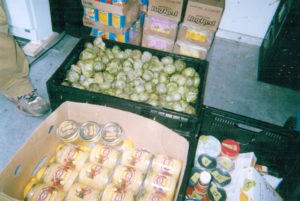
The pantry served shoppers, volunteers, hungry people. Volunteers fed everyone in the line. No exceptions.
Distributing groceries brought forgiveness and healing. Healing was an after thought of forgiveness.
For me, healing required some commitment and thought. Whether or not this was true, questions always arose:
“Am I ready to be healthy?”
“Can I get well if it’s scary?”
“Can I leave the old me aside if it’s necessary for healing?”
“Why am I going through this?”
“What is the meaning of it all?”
These questions could be painful. Healing can be hard on everyone.
The pantry line had massage therapists, Reiki practitioners, medical intuitives, and other healers.
As a healer, I know healing happens on several levels in our lives: physical, mental, spiritual, emotional, mythical. Both healing and getting well were special challenges because many of the people in the hallway, the pantry room, and out in the parking lot didn’t have health care.
While he had his office, Woodstock had Dr. Longmore. After his office closed, things were tough for many. As health care became scarce, everyone became personally involved with the differences between healing and getting well. For some, this was part of the spiritual journey.
Hunger often went beyond a plate of beans or a jar of peanut butter. That’s why food is essential to healing. That’s where homemade soup comes in.
Sharing food in the pantry helped people heal. Fresh vegetables, eggs, and Bread Alone bread offered a healing experience with abundance. As we fed the shoppers, we helped ourselves and each other.
In some cases, the shoppers became the volunteers or the volunteers joined the shoppers. Shoppers came to get food and found they could volunteer. Volunteering changed them. As a person distributed groceries, the volunteer made contact with another person and was able to smile.
Pantry experiences coaxed us out of our own problems. Offering a sense of community gives back so much more.
Do you want to be healed? Healing and feeding are connected.
Sooner or later, we all get sick. Finally, we die.
No one escapes. This truth is harder on hungry people who have no $$$ for health care.
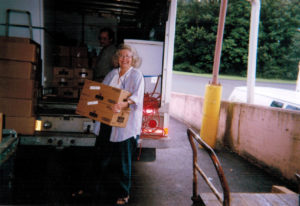
Hungry people are often blamed for their inability to deal with the situation. It’s as if it’s their fault for being down and out in Woodstock. If they lived right, they would be healthier, make more $$$ in their jobs.
If critics stopped and thought about how insufficient nutritious food, improper housing, and inadequate or nonexistent healthcare impacts a person, they might feel differently.
What did it matter that there were no jobs in the area and none of those that came open paid over $8.00 an hour?
Because they were down and out, they must be guilty of something.
They were negative thinkers, lacking faith, and basically lazy. Something.
They were gay, trans, promiscuous, alcoholics. Something.
They were freeloaders, irresponsible, flaky. Something.
Healing and getting well are two different things, acting in different ways. But, whether a person heals, gets well, or both, change happens.
“Do I want to heal?”
“Do I want to be well?”
“What if I come out of this experienced a different person?”
“What if it takes a long time?”
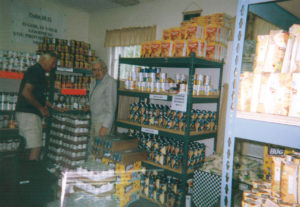
In the midst of this, the pantry offered some normalcy to the shattered lives of hungry people when they took pantry food home to wherever and whatever that was, fixed a meal, and served it to those in the household.
It was supper from the pantry.
Health issues pointed to the spiritual challenges which popped up on the path to the pantry. Healing was on the agenda. We all wanted to get well.
People getting well overcome symptoms. Getting well means doctor’s visits, therapy, pills, creams. These things were simply not an option for pantry shoppers because there was no money.
Symbolic healing occurred in the hallway on pantry days as shoppers and volunteers discussed their diabetes, PTSD, cancer, allergies.
Working and shopping in the pantry was therapy to volunteers and shoppers. These hallway conversations were cheaper than the physical and mental health services they had no money for anyway.
These conversations were essential because talking about a health issue promotes healing. Shared symptoms gave us all support, strength, validity.

Everyone walking through the door to the pantry, whether a shopper or volunteer, was asked to leave the past behind. This experience was different for everyone. But, think about it, how can we move forward into our new lives if we never give anything up.
For some, giving up the past means letting go of things lost: the job, the home, maybe the family, self-esteem, the car, good health, money, insurance, the pet, anger, or drugs.
As the past disappears, the remaining spiritual baggage weighs less and less. Prejudices become fewer. Fears diminish. We heal!
Some things surrendered were physical, some mental, and some emotional. But, one thing is certain, whatever the category, the experiences all had a spiritual aspect.
Giving and receiving food brought everyone a little peace.
Everyone coming to the pantry heals somehow. The pantry community supports and approves hungry individuals as they climb back on the road to wellness and something offering normalcy.
Nobody just wakes up one day and says “I think I’ll go down to the local food pantry and volunteer.” People spending time in pantries all travel down the path. Healing has signposts along the way.
Some needed physical healing. Volunteers occasionally came to the pantry so ill that they were barely able to make it into the building. When this happened, I stationed them at the Items of Dignity table distributing toilet paper, shampoo, razors. They offered one roll of toilet paper and one other item to each shopper.
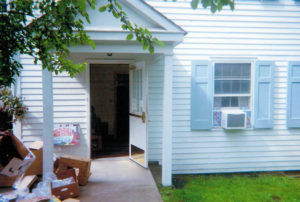 Each week, Deanna slowly walked the two blocks to the pantry and then worked in the hallway a couple of hours while she gathered enough energy to return home.
Each week, Deanna slowly walked the two blocks to the pantry and then worked in the hallway a couple of hours while she gathered enough energy to return home.
“Don’t forget your roll of toilet paper, Judith. We’ve got some hand cream today. Can you use that or would you prefer tooth paste?”
When Deanna finally couldn’t work in the hallway anymore, Rachel gracefully sat at the Items of Dignity table helping shoppers choose their two items. Rachel lived in nearby Mt. Tremper. Her living situation seemed somewhat precarious because every few months she looked for a new place to live. She lived in her car a couple of times.
Thank you for reading this blog post. This is the first food pantry article on healing.
Please forward this article with your preferred social media network. Share it with a friend.
If you are interested in healing, please check out my other blog: www.reflexologyforthespirit.com.
Thanks again.
Thurman Greco
Woodstock, NY
PS: Many programs are now uploaded to YouTube. More are being added weekly. Enjoy!
![]()
